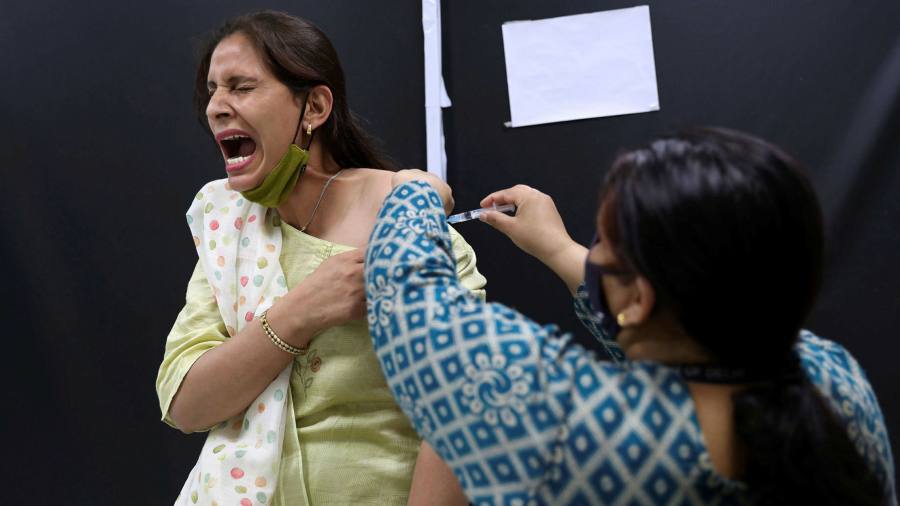[ad_1]
I first arrived in India in the mid-1990s at the tail-end of its socialist-style “Licence Rajâ€. New Delhi was relaxing control over the country’s economic life, but basic amenities — long the monopoly of the state providers — were still in short supply.
Getting a phone line installed into my New Delhi apartment — in an upscale neighbourhood in the heart of the capital — took about four months and an all-cash “facilitation†fee. If my cooking gas cylinder was empty, replacing it could take days. Airline capacity was far below demand, but my travel agent “knew people†at the monopolistic state carrier, and could sometimes get a seat “released†if my work required travel on short notice.
I’ve been reminded of these years while watching the first phase of India’s sluggish Covid-19 vaccine rollout, which began in mid-January.
So far, India’s chronically overstretched and underfunded public health machinery has given just 12.3m jabs, or around 0.8 doses for every 100 residents.
At the current pace of around 400,000 jabs a day, India would need four years to cover the first batch of 300m Indians — health workers, frontline workers and the elderly — targeted for vaccination by August.
Most states offer Covid-19 inoculations only a few days each week. Overloaded state health workers have so much else to do, including catching up on routine childhood immunisations, which came to a halt in last year’s lockdown.
But the vaccination drive looks set to gain new momentum after Narendra Modi’s government decided on Wednesday to let private hospitals start providing the jabs to those who can pay for them.
From next week, Indians over age 60, and those over 45 with health problems that raise risks of severe Covid, can go to up to 20,000 private hospitals or 10,000 government-run vaccination centres. While the government will give out jabs free, those vaccinated privately in hospitals will be charged, with New Delhi to fix the price in the coming days.
The decision follows urgent appeals from the Confederation of Indian Industry, and other business luminaries. They warned of the risk of a disruptive new wave of cases unless private players were allowed to help accelerate the rollout.
Unlike many developing countries, India does not lack vaccines. The Serum Institute of India, the world’s largest vaccine-maker, has stockpiled tens of millions of doses of its locally manufactured version of the Oxford/AstraZeneca jab — and can produce 50m more doses a month.
Other large Indian pharma groups have tie-ups with multinational drugmakers to make their vaccines, which are now undergoing trials to assess their local efficacy. Bharat Biotech, which has developed the indigenous Covaxin, is expected to release efficacy data in two weeks.
But Modi’s initial decision to rely exclusively on government health infrastructure for vaccine distribution was a major bottleneck in a country where 75 per cent of all outpatient healthcare, and 55 per cent of inpatient care is typically provided by the private sector.
Indians have also expressed anger as New Delhi approved the export of 33.5m locally-made vaccine doses to nearly 30 countries, even as the pace of domestic inoculation crawled.
“There are many elderly people who have not stepped out of their home for a year because of the fear they will get Covid,†says Sushila Kataria, who oversees the Covid-19 treatment programme at Medanta Hospital. “The only bottleneck to faster vaccination should be production of vaccines.â€
India has recorded a precipitous drop in daily new confirmed cases from nearly 100,000 a day in mid-September to 11,000 per day in mid-February. Indicators point to economic normalisation, with manufacturing activity now back to pre-pandemic levels.
Yet as Indians abandon masks and social distancing, cases have begun to tick up, with the seven-day moving average of new cases rising more than 18 per cent in the last 10 days. Seeing this data, many fear that India could be poised for a new surge.
Modi’s decision to step up the pace of the vaccine drive with private help gives the country a fighting chance to stay ahead of the pandemic curve.
[ad_2]
Source link





